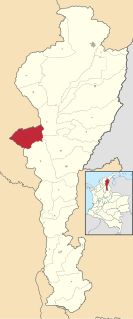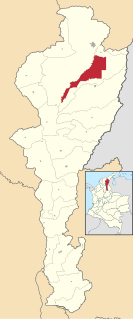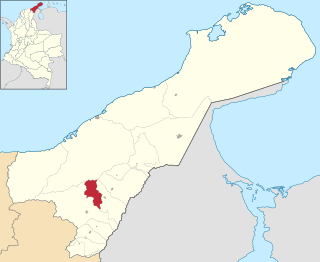
Cesar Department or simply Cesar is a department of Colombia located in the north of the country in the Caribbean region, bordering to the north with the Department of La Guajira, to the west with the Department of Magdalena and Department of Bolivar, to the south with Department of Santander, to the east with the Department of North Santander, and further to the east with the country of Venezuela. The department capital city is Valledupar.

The Archipelago of San Andrés, Providencia and Santa Catalina, or San Andrés and Providencia, is one of the departments of Colombia, and the only one in North America. It consists of two island groups in the Caribbean Sea about 775 km (482 mi) northwest of mainland Colombia, and eight outlying banks and reefs. The largest island of the archipelago is called San Andrés and its capital is San Andrés. The other large islands are Providencia and Santa Catalina Islands which lie to the north-east of San Andrés; their capital is Santa Isabel.

La Jagua de Ibirico is a town and municipality in the Department of Cesar, Colombia. This region of La Jagua is rich in coal which is exploited extensively and is second only to El Cerrejon in La Guajira. The area is also known for being a hot spot in the Colombian conflict.

Chimichagua is a city and municipality in the central region of the Department of Cesar, Colombia. Approximately one third of the municipality of Chimichagua is water. The municipality seat lies by the Cienaga de Zapatosa marshes.

Astrea is a municipality and town of the Department of Cesar in northern Colombia.

Manaure also known as Balcón del Cesar is a Colombian town and municipality located in the northeastern region of the Cesar Department on the Serranía del Perijá.

Pelaya is a town and municipality in the Colombian Department of Cesar.

Río de Oro is a town and municipality in the Colombian Department of Cesar.

San Diego is a town and municipality in the Colombian Department of Cesar. It was founded on 19 July 1609.

San Martín is a town and municipality in the Colombian Department of Cesar.

Tamalameque is a town and municipality in the Colombian Department of Cesar. It was originally the site of a Chimila settlement, Thamara. Tamalameque is located on the right bank of the Magdalena River and borders Chimichagua and Pailitas in the north, Pelaya in the east, La Gloria in the south and in the west the departments of Bolívar and Magdalena.

Barrancas is a town and municipality of the Colombian Department of La Guajira. The municipality of Barrancas is located to the left margin of the Ranchería River in a valley formed between the Sierra Nevada de Santa Marta mountains and the Serranía del Perijá. Barrancas has a total area of 742 km2 and at 40 meters over sea level. The average temperature is 28 °C throughout the year and distances from the capital of the Department of La Guajira, Riohacha. It became a municipality in 1892.

Distracción is a town and municipality in the Colombian Department of La Guajira. Founded in 1845 by a man from neighboring Barrancas named Antonio María Vidal on the right margin of the Ranchería River.
Cristian Moreno Panezo is a Colombian politician and lawyer from the Universidad del Atlantico with a specialization in constitutional law from the National University of Colombia. On October 28, 2007 Moreno was elected as Governor of Cesar Department for the period 2008-2011. He became the first independent candidate to win in the Cesar Department.
Alfonso Araújo Cotes is a Colombian politician, two time Governor of the Department of Cesar; the first term between September 21, 1968, and August 21, 1970, and the second term between June 7, 1975, and August 30, 1997.
José Antonio Murgas is a Colombian politician. Murgas was Minister of Work and Social Security under the presidency of Misael Pastrana by Decree 739 of April 17, 1973 replacing Crispin Villazon de Armas. Murgas was also appointed Governor of the Department of Cesar between August 22, 1970 and June 17, 1971. Murgas also served as Ambassador of Colombia to the United Nations.
Manuel Germán Cuello was a Colombian politician, Mayor of Valledupar in 1967 and Governor of the Department of Cesar by appointment under the presidency of Misael Pastrana between June 19, 1971 and August 13, 1974. Cuello was member of the Colombian Conservative Party.
Luis Roberto García Díaz-Granados was a Colombian politician and two time Governor of the Department of Cesar. He also served as Viceminister of Labor and Social Safety under the administration of President Julio César Turbay Ayala.

The Chimilas or Ette Ennaka are an indigenous people in the Andes of north-eastern Colombia. Their Chimila language is part of the Chibcha language family, of which there were estimated to be around 1000 speakers in 1998. At the time of the Spanish Conquest the Ariguaní River valley was the strategic centre of their territory. On the Serranía del Perijá mountains the Yukpas were also part of the Chimila confederation of tribes.
















































